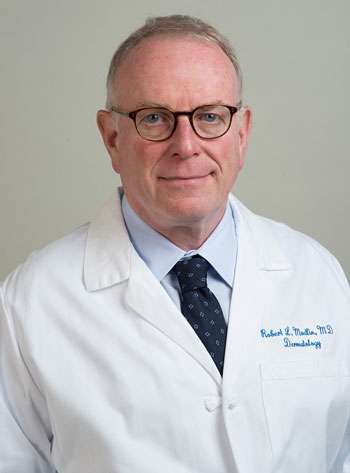Robert Modlin Lab: About the PI
About Robert L. Modlin

Robert L. Modlin, M.D., completed his undergraduate studies at Johns Hopkins University. He received his medical degree at the New York University (NYU) School of Medicine. Modlin was a pediatrics intern at NYU and a dermatology resident at Los Angeles County/University of Southern California School of Medicine. Dr. Modlin's primary research mentor is Barry R. Bloom, Ph.D.
Since 1990, Dr. Modlin has worked at UCLA, presently as:
- The Klein Professor of Dermatology
- Professor of Microbiology, Immunology and Molecular Genetics
Dr. Modlin's interest in leprosy began during his dermatology residency at the Los Angeles County/University of Southern California Medical Center, learning from Dr. Thomas Rea. The goal of his research is using the study of leprosy as a model to learn about mechanisms of host defense in humans.
Dr. Modlin’s research goal has yielded the following:
- His laboratory has made fundamental insights into T-cell subsets, cytokine patterns, antigen presentation, innate immunity and antimicrobial mechanisms in the human immune response to infection.
- He has been awarded three patents for this research.
Dr. Modlin has published more than 180 articles, including 13 papers in Science and Nature, and 4 in Nature Medicine. The Modlin lab's manuscript identifying distinct T cell cytokine profiles in leprosy lesions has been cited more than 1,000 times. An exciting recent discovery is the elucidation of the mechanism by which vitamin D subsets contributes to innate immunity against tuberculosis in humans, providing a rationale for therapeutic intervention.
Dr. Modlin’s additional accomplishments include these awards, memberships and positions:
- He received the Montagna Award for outstanding young investigator from the Society for Investigative Dermatology.
- He has given the Sulzberger lectureship of the American Academy of Dermatology.
- He received a merit award from the National Institutes of Health for his research on Toll-like receptors.
- He is a member of the American Society of Clinical Investigation and the American Association of Physicians.
- He has served as deputy editor for the Journal of Immunology and is a member of the editorial boards of the Journal of Clinical Investigation, Infection and Immunity and Immunology.
- He has served on the Society for Investigative Dermatology Board of Directors.